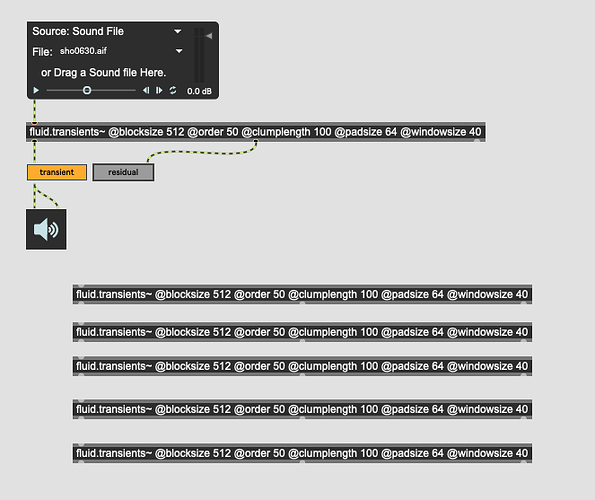Before posting this as a git issue, wanted to check here to see if I’m missing something.
It seems like fluid.transients~ likes to make pops all over the audio when it’s loaded up. As in, if I’m using something like this in a patch, the audio starts crackling like crazy, even with the (average) CPU usage very low.
Here’s a simple patch showing what I mean:
<pre><code>
----------begin_max5_patcher----------
2033.3oc6ZssjiZyD9ZOOETjbo2ojDmL+WM+OGaskKYiLiRvHJP3Y1jJ6ydz
IvhSdvri8NIYmK7HTKg59qOntE5OeXk6N1qjJWm+mymcVs5OeX0JUWxNVYdd
k6Q7q6yvUpg4tq.y2+Lozcsl3IJ4kSzJ5NZFk+U4PfFJrCGpHb869S9OBV67
IuGANewPNis+2IIIk3zp8krrL4.AFZ6yn6+c9ykr5zms6mji2kQdd3DzDNMj
fdUpn+Awt2coGYIc6gUlHDJqdxwGUivMgbjUwpySdT.DBouQxY07LBm+0BhV
Fcqno4Xwp2HgzD07Y69sOEzLIbYpAtce5.Mi3tVLumYfPOviX5A4iOkwXEhF
PY6SrLQyynVd8QZtXYqrYUkJglmtsjr2.3QdR.OHR9KBFK+2l3G67dz7u5EA
kc9WO7f7m0yzPHm7hPxZjKN4U0J6dHqll7HuDmWQI47pu47zNoRPpBbBfHmm
THsS.v4o8Y0GKxH4o7mcf.QGEXkpxIz24oWn4IrWTO5CdKLescqQ0.Pj6XPH
bZHDhBTXHRgdBVWgknIAQu+C.hvEBh9a.+DDa.QvRAQOzOAQCHFuPLzK1+mX
nAC2rTLL3FZGtr7KTQW.+CJ6hqI4A+vFvfbbGIwFCrRmn09RpuKIUzjZ62WG
cL5sRb.AUYN.88eLP7j2zYNX+lzh3pVM6JWYJNmHkUTVt0nE7cQgU2qrlhzb
32XpWzl0scQy0cE11UIQZUnmueau3Rg7vEBScoN4sWC8cO+ZDpkx7ZZaJOJC
SCKoLAkI8UUf2qmrzRsg7YDxS4DrYi723XENEEEcFgjF.ZCCKEtPiWPxo4EB
MiPGg48QjDxAbcFe6AlHBgwfBJ0EiP+fgAGkXadq++Rpz42LjzRZBKWxDVF.
5taVNgCtxOBBrEF0HxwEiLYgwo.U5RrUfpDBYc0Nbox6MizYlbFKqKo14kQN
vMjKn448PQNqXZhkzzmuvb2wDDOdo2shR015bM0sBSB91J7otnMGmkYB0280
+JNmdDyIbpVEf.sDGDaA1kxoQnjHLw2Sdglv0gorMFDCmVzXD41pkSnojJd2
93XcLhy8Tw+pFzs5ptIv6VNQrCjPJ5N.gyAshKJU4kJy.aLzrAfy0RZ6RaGy
uS+WZ+yt6glwvIBWyJGfM4AQQai2MHoK6oM19cSEOLzW6S3AUN5Jee63gSUM
0pls9LQYVHjHkYbJYTLQ1fk67KnkAIHzjXB5xXRfFLLXRr2GLLY4Hh+RQDe+
Paqj3OfVIvE53rYoXhWGLQuQ4cDSzuV2IzzfkFO.o12G4qL58.M+dAgBXQYO
63QYJZ1gVUrVdB406uexRsIhWpMAJLxxlXy8NxwarAyNbd5EQD0.lDU7WrMk
AUTklFhtyfhhMunX2q1jA0mLobCtrbC8sj6Y4KAuFeIzGIPxaofjNfysBiti
dWpz2VXDmvk5ZA2XAe28r2t.hHpSnj952bPNPmmJwGKbff4Xes9BnTzhCKqA
oXSZcalALgtSaT8qPGfyutzD57VJhXra7.5uiB5CTBcB3XgdQH32IbfBzAf7
+.AGvECGwemY6+iBMxnmHOpjeqk6Dtsf7yC3yvuXOF6Cex9H+7MmdpH4CckK
82fYHldovPvfNKJVDcivIka0mzQ+f155STSt8TKmfmGapSNwqYWhFEJL3BfP
u3eVTjmPTxVLWDQeWMmbtUkk1zRcJ0VY0D1Aax1z6hZ0GMntXVPIxK9OpC52
YBYr7zQLE7sME5LgiBqqdfTW5rjdGn8fgT8LqjObQmZEarjPmI25WX27t5rL
COEv6riR3BcTrNq+qzSYzYtfDp9WsqRv+rcUNe18Yz7oNQVkpURebenJVc49
FiXylkNcUxIjJNMu0b6ymS4p2.ORSJXzbtgS7CBTeTISl4wQsO47kY43esrd
zbYcfdf2DlHblLAL7svOCh4EaAedw2LzyelLtDkg2Hdv6J3gaENflKPHS+YV
d.v.UVG1Ocq38qD.eaiOjtTwPcURcdBFoNUGO0.g5uL5sQpPuaZj.efJJD.Z
oQTOcq3c3UFO8lvEv32snRnnPKDrIp9MDAkeXh2Id2yReee384taPiYxsgKB
lIWDeKYh4FVcj3uiaBB02cklvpvn94n2bWbf+fEHz0IPlXTWPf.+XEnQhlLt
.oScw5gwEGuevhylqS+38lFbnai.8tsKXne70rK345LTWnjIJznsTGQoSgV2
npyWaowkS798hxT2yxz27KYw2ajEeuwKFACksh.wa.9BDuGduK0ZV5P5s+Hb
g5LVYoWpQuklKuQZj9E5CLS0FAVaoqJk2nyA2mFI1JjLpsW4X55NfSuuwzkg
mN.iOxK.EKYVuHTfupEJxO.duX8AGP6kY9coGnYYshvXk8iySM2YrnyW7IMk
ZNKsDmPMeXqND6.KnX.LVYp3YLUjsDcAGXzXlIr0TKT7Wz5QaM9TQMSMZyFg
5X8nsFL0hRVAqrwSUvdw1TaJ92sUdsp7+1YEOzS85sH5e8KtBqYE+5KLiAHU
KgpS.KuWVxl2gNN1Ud4jI+QBd+2bG4N86trqYqthI+flem3V1B92+kQ26ZuL
5ZDDFAu96htZHcObLMh1eqWCtNXK2N6jNw1sV0sMPyM20wObFKTm8+6kc6se
kgCWYv20J6MiEtg69tWH3bVHXmERa7z6BrKWidWb8dWZ8gWX8our58un5pfc
ScA0e3ud3uoevPAE
-----------end_max5_patcher-----------
</code></pre>
(I pasted a few more instances just to exacerbate the issue)
And here’s a video showing what I mean (filmed with my phone in case the audio driver doesn’t capture the glitches):
It sounds like what happens when you have audio in interrupt on and have a metro banging like crazy somewhere, but that’s not the case here, it’s just overdrive on.
Is this normal/expected behavior?

